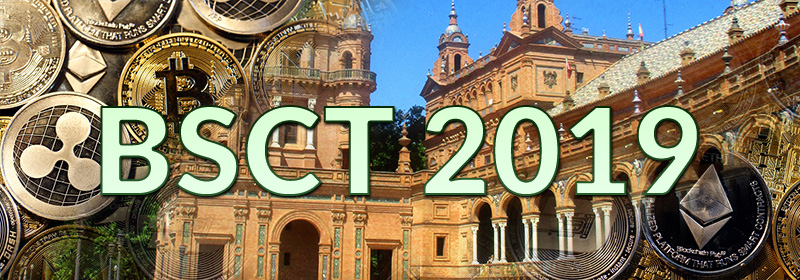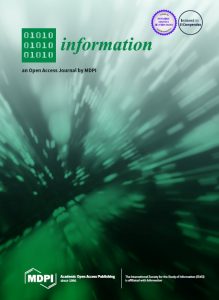| ← Workshops | BSCT.BISconf.info |
Topics of interest | Submission guidelines | Important dates | Special Issue | Organizers and Chairs | Program Committee
Accepted Papers
- Comparing Market Phase Features for Cryptocurrency and Benchmark Stock Index Using HMM and HSMM Filtering
- Contagion in Bitcoin Networks
- Towards Blockchain and Semantic Web
- Detecting Brute-Force Attacks on Cryptocurrency Wallets
- Analyzing Transaction Fees with Probabilistic Logic Programming
- An On-Chain Method for Automatic Entitlement Management Using Blockchain Smart Contracts
- Study of Factors Related to Grin Cryptocurrency Mining Efficiency with GPUs
- Towards Blockchain-Based E-Voting Systems
- Internet of Things and Blockchain Integration: Use Cases and Implementation Challenges
- Wikipedia as an Information Source on Cryptocurrency Technology
Blockchain and smart contracts became a hot topic especially in recent year. News around the world cover the matters of cryptocurrencies with bitcoin bubble on forefront. The number of published studies is rapidly growing. Even notable financial institutions turn their attention to potential blockchain revolutional outcomes despite that the technology was initially to overthrow their position. That is why profound and comprehensive reflection on the concerned issues is needed. And it is needed urgently as the technology progresses and regulational bodies must act in order to define some common ground and rules of conduct for all the involved parties.
When in 2008 bitcoin has been invented it seemed that numerous problems have been overcome and that it will pave a certain path for a new era of digital currencies. In fact after a decade it becomes more and more evident that it also introduce further challenges perhaps even more fundamental than it initially solved. As a digital society we are currently in a state of various uncertainties. We have a vast and thriving ecosystem of over 2000 cryptocurrencies. Some of them are in fact merely clones (or rather “forks”) but some differ from others immensely. The bitcoin itself turned into a major speculative instrument. And the pseudo-anonymous nature made it a financial asset of choice for gray markets. In the meantime the ICO emerged as a cheap yet risky replacement for business financing and fund-rising opportunities. The various consequences and perturbations of abovementioned and others effects are far from being predictable in long run.
The second International workshop on Blockchain and Smart Contracts Technologies (BSCT), co-located with 22nd International Conference on Business Information Systems (BIS 2019) being held in Seville, Spain is a continuation of previous year successful event. It should be perceived as a forum that bring together practitioners and researchers for sharing knowledge, introducing original insights as well as advancing innovational ideas. The aim of the workshop is to closely explore emerging challenges and opportunities in the field of blockchain technologies. Moreover, this time the audience attention shall be especially turned toward issues related to blockchain architectures, new business models as well as innovative applications, use-cases based on distributed ledger environments and standardization initiatives.
The workshop is open to any research or position papers describing current work relating to blockchain and smart contracts technologies with respect to applications, analysis, simulation results, proof-of-concept or innovative solution approaches.

Short URL: BSCT.BISconf.info
Previous edition of the workshop – BSCT 2018.
Topics of interest
- 1) Blockchain technologies
- a) Consensus protocols
- b) Distributed ledger analytics
- c) Innovative approaches and paradigms
- d) System consistency
- 2) Cryptocurrencies
- a) Impact on economy and society
- b) Economic implications
- c) Macro and microeconomic models for cryptocurrencies
- d) Financial aspects of ICO
- 3) Smart contracts
- a) Smart contracts deployment and maintenance
- b) Smart contracts testing
- c) Programming techniques
- d) Development and runtime environments
- 4) Performance
- a) Performance Measures of blockchain
- b) Assessment of consensus protocols
- c) Blockchain and Big Data
- 5) Security and Privacy concerns
- a) Identity management in anonymous environments
- b) Blockchain vulnerabilities and attacks schemes
- c) Anomaly detection
- 6) Legal and organizational issues
- a) ICO
- b) DAO & Governance
- c) Legal regulations
- d) Data protection issues
- 7) Industry applications
- a) Fintech, healthcare, insurances, fraud detection, supply chain, audit
- b) Asset digitization
- c) Distributed ledger & IoT solutions
Submission guidelines
- Long papers: max. 12 pages
- Work-in-progress reports: max. 6 pages
- Demo papers: max. 4 pages
Papers must be submitted in PDF format according to Springer LNBIP template
Submission system is available at EasyChair.
Papers approved for presentation at BSCT 2019 will be published in BIS 2019 workshop post-conference proceedings, as a volume in Springer’s Lecture Notes in Business Information Processing (LNBIP) series. BIS 2019 Workshops proceedings will be distributed to workshop participants by regular mail.
Workshop papers will be made available in electronic form by the BIS organizers to all workshop participants (and only to them) directly before the conference.
Important dates
- April 29, 2019 (extended) – submission deadline for papers
- May 22, 2019 (extended) – notification of acceptance/rejection
- June 1, 2019 (extended) – submission of final papers (for presentation)
- June 26-28, 2019 – the workshop
Special Issue
 Authors of the accepted papers will be invited to extend their work to be published as part of Special Issue “Blockchain and Smart Contract Technologies” in MDPI “Information” journal.
Authors of the accepted papers will be invited to extend their work to be published as part of Special Issue “Blockchain and Smart Contract Technologies” in MDPI “Information” journal.
Information is an online open access journal of information science and technology, data, knowledge and communication. It publishes reviews, regular research papers and short communications. It is indexed among others by Ei Compendex, Scopus, Emerging Sources Citation Index (ESCI – Web of Science).
All extended papers presented at the BSCT 2019 workshop will be published in the special issue free of any charge if accepted after peer review. The requirements for extendent papers are as follow:
- At least 40% new content is needed for extended papers
- Should not be exceed 30% copy/paste from conference papers
Organizers and Chairs
- Saulius Masteika, Vilnius University, Lithuania
- Erich Schweighofer, University of Vienna, Austria
- Piotr Stolarski, Poznan University of Economics, Poland
Program Committee
- Emmanuelle Anceaume, IRISA, France
- Jan Beinke, University of Osnabrück, Germany
- François Charoy, Université de Lorraine – LORIA – Inria, France
- Nicolas T. Courtois, University College London, United Kingdom
- Stefan Eder, Benn-Ibler Rechtsanwälte GmbH Austria
- Ernestas Filatovas, Vilnius University, Lithuania
- Adrian Florea, ‘Lucian Blaga’ University of Sibiu, Romania
- Vladislav V. Fomin, Vilnius University, Lithuania
- Jaap Gordijn, Vrije Universiteit Amsterdam, Netherlands
- Ralf-Christian Härting, Hochschule Aalen, Germany
- Aquinas Hobor, National University of Singapore, Singapore
- Constantin Houy, Institute for Information Systems at DFKI (IWi), Germany
- Monika Kaczmarek, University Duisburg Essen, Germany
- Kalinka Kaloyanova, University of Sofia, Bulgaria
- Salil S. Kanhere, The University of New South Wales, Australia
- Gary Klein, University of Colorado Boulder, USA
- Raimundas Matulevicius, University of Tartu, Estonia
- Massimo Mecella, Sapienza University of Rome
- Remigijus Paulavičius, Vilnius University, Lithuania
- Cristina Pérez-Solà, Universitat Autònoma de Barcelona, Spain
- Kouichi Sakurai, Kyushu University, Japan
- Davor Svetinovic, Masdar Institute of Science and Technology, United Arab Emirates
- Herve Verjus, Universite de Savoie – LISTIC – Polytech’Savoie, France
- Hans Weigand, Tilburg University, Netherlands
- Edgar Weippl, SBA Research Austria
- Jakob Zanol, Working Group Legal Informatics Austria
Contact
- Piotr Stolarski – piotr.stolarski@ue.poznan.pl
